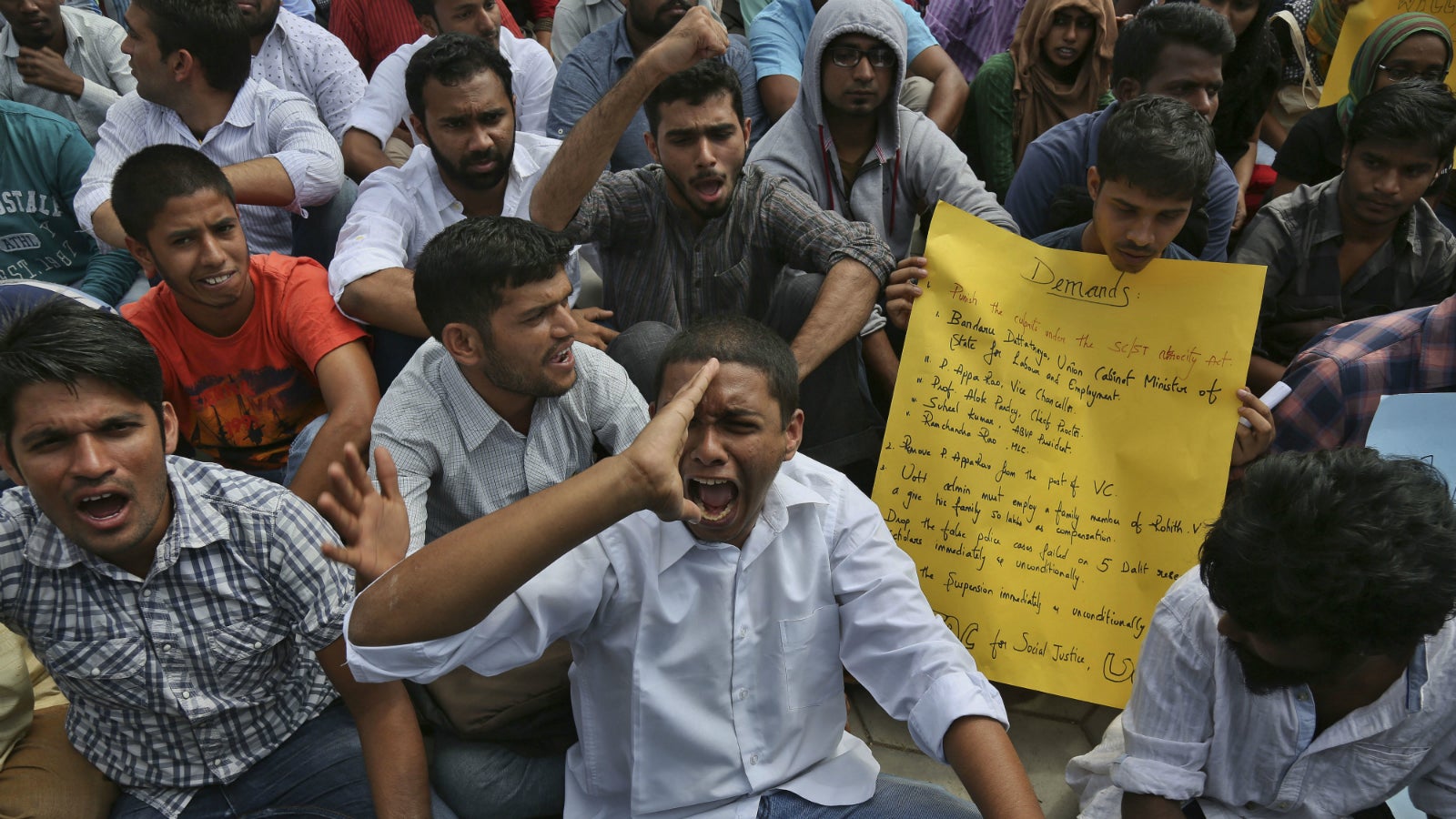Rage at Indian universities as millennia-old wounds turn raw after Dalit student’s suicide
This post has been corrected.


This post has been corrected.
College students are up in arms across major Indian cities. Delhi, Mumbai, Hyderabad, and Pune have witnessed massive demonstrations since Monday (Jan. 18).
The protests were sparked by the suicide of a doctoral student at the University of Hyderabad—also known as the Hyderabad Central University—on Sunday (Jan. 17) night. Rohith Chakravarthi Vemula, 26, hung himself in a hostel room in the university campus.
Vemula was one of five students banned from the hostel, libraries, and other common areas in the campus following a dispute with a rival students group. Last year, the university administration had found him and his associates, part of the Ambedkar Students’ Association (ASA), guilty of assaulting Nandanam Susheel Kumar, a member of the Akhil Bharatiya Vidyarthi Parishad (ABVP), the Bharatiya Janata Party’s (BJP’s) student wing.
Kumar had alleged that the ASA members had attacked him in August after he criticised the group’s decision to protest the hanging of Yakub Memon, convicted for his role in the 1993 Mumbai serial bombings.
But protestors claim that the university was pressured by the central government, led by prime minister Narendra Modi, into taking action against the ASA students. According to media reports, central labour minister Bandaru Dattatreya had written a letter to the Smriti Irani-led human resource development ministry about the ASA protest, in which Dattatreya termed the University of Hyderabad “a den of casteist, extremist and anti-national politics” and the university administration a “mute spectator.”
Reports say that ABVP member Kumar had approached Dattatreya, seeking help against the ASA students. However, Munna Sannakki, another PhD student at the university and ASA convener, said their members had never attacked Kumar. “He (Kumar) filed a false complaint,” Sannakki told Quartz. “He started blaming us and brought in the BJP pressure from outside.”
ABVP officials did not respond to requests for comment. However, Kumar told the website The News Minute that while he did seek Dattatreya’s help, he “never imagined” this would culminate in Vemula ending his life.
Authorities have so far been muted in their response. Irani told reporters that she would not comment until after the results of the probe are out. A ministry spokesperson denied pressuring the university to suspend the students. A series of letters and emails written by ministry officials to the university authorities could contest this last claim, though.
While the deceased student’s caste status is under dispute, he came from a poor family: his mother is a tailor, and his father was a security guard, according to a Facebook post he shared last year. The student union he belonged to—the ASA—takes up issues related mostly to Dalits—the former untouchable castes of India.
While Vemula’s suicide is being probed, protesters are angry at the role of authorities in the events. They want ministers Dattatreya and Irani, and university vice-chancellor Appa Rao Podile to resign.
They are also angry at what they say was officials’ insensitivity. A widely shared social media post on Monday alleged that the police secretively cremated Vemula’s body, barring even his family members from attending the funeral.
“This is all because of political discrimination,” said Sannakki. “[The authorities] want to show their power. They don’t want [Dalits] to raise our voices.” He called Vemula’s suspension a “social boycott,” referring to a medieval practice of ostracising those who had violated caste rules, and alleged that it was in retaliation to the students’ political outspokenness.
Cultural shock for Dalit students
Many Dalit social movements in India describe themselves as “Ambedkarite” after the venerated framer of the Indian constitution B.R. Ambedkar, a former “untouchable” himself. Ambedkar saw education as essential for social progress, and many Dalit students turn to publically-funded universities to reverse centuries of discrimination in which people of the scheduled castes and tribes—as they are officially called—were denied access to education.
Such students face various forms of discrimination at institutes of higher education even today.
Even last year, hundreds of students had protested against the government’s decision to discontinue fellowships for humanities and social science research. The said fellowships are especially important for students from poor and disadvantaged backgrounds like Vemula, who often rely on such support to finance their education.
“Besides, there is a lot of cultural shock at central universities,” Ravichandran Bathran, a fellow at the Indian Institute of Advanced Studies said. “Your dress isn’t suitable compared with the upper-class students, so the security guards keep stopping you at the gate. The faculty speaks in flowery English that you don’t even understand. And you always imagine you are inferior to them, which makes you think not to ask any questions.”
Coming from poor families, Dalit students also face enormous pressure to succeed. This leads to disproportionately frequent suicides among such students.
“When you commit suicide after failing Class 10 standard, it’s more about how you failed your mother and father, and failed something you believed in,” Bathran said. “When universities rusticate you, you cannot tell your parents because they will not understand. Dalits are born and taught not to blame society, but rather that they have to fight and live with that situation.”
The hopelessness of their condition was evocatively brought out in Vemula’s suicide note. “The value of a man was reduced to his immediate identity and nearest possibility,” he wrote. “My birth is my fatal accident.”
Correction: The earlier version of this story erroneously said that Vemula was found guilty of assaulting Kumar in August. The university had actually set up an inquiry against Vemula in August and suspended him in later months.